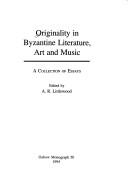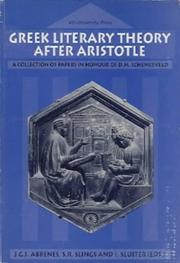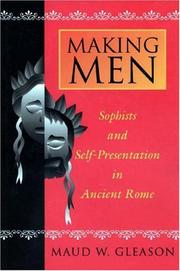| Listing 1 - 10 of 11 | << page >> |
Sort by
|
Book
ISBN: 9609019919 9789609019910 9789609019965 960901996X Year: 1995 Publisher: Hērakleio: Theokarēs Detorakēs,
Abstract | Keywords | Export | Availability | Bookmark
 Loading...
Loading...Choose an application
- Reference Manager
- EndNote
- RefWorks (Direct export to RefWorks)
Book
ISBN: 8478821996 Year: 1995 Publisher: Madrid : Ediciones Clásicas,
Abstract | Keywords | Export | Availability | Bookmark
 Loading...
Loading...Choose an application
- Reference Manager
- EndNote
- RefWorks (Direct export to RefWorks)
Greek literature --- Balkan literature --- Byzantine literature --- Classical literature --- Classical philology --- Greek philology --- Criticism, Textual&delete& --- Congresses --- Criticism, Textual
Book
ISBN: 3598719353 3110948850 3519019353 9783110948851 9783598719356 9783519019350 Year: 1995 Volume: v. 14 Publisher: Stuttgart B.G. Teubner
Abstract | Keywords | Export | Availability | Bookmark
 Loading...
Loading...Choose an application
- Reference Manager
- EndNote
- RefWorks (Direct export to RefWorks)
Prolegomenon Sylloge (Rhetores Graeci, vol. XIV) (Bibliotheca scriptorum Graecorum et Romanorum Teubneriana).
Rhetoric, Ancient. --- Greek literature. --- Balkan literature --- Byzantine literature --- Classical literature --- Classical philology --- Greek philology --- Ancient rhetoric --- Classical languages --- Greek language --- Greek rhetoric --- Latin language --- Latin rhetoric --- Rhetoric
Book
ISBN: 9782351594872 Year: 1995 Publisher: France : Presses de l'Ifpo,
Abstract | Keywords | Export | Availability | Bookmark
 Loading...
Loading...Choose an application
- Reference Manager
- EndNote
- RefWorks (Direct export to RefWorks)
While Libanios was content to praise the countryside in his teaching and classes, his speeches, firmly linked to everyday life, present reality differently. It is all of these passages that have been the subject of our study and that we have called the discourse of rural realities. Perhaps this crucial point should be emphasized. The real subject of the Lebanese discourse, to which in fact all the information the speaker gives us about the campaign, is the survival of his city and, more importantly, its greatness. These necessarily go through the control of the rural territory of the city.For Libanios, the interdependence between the urban center and the countryside of Antioch is absolute, it constitutes a socio-political and economic system which must remain autonomous, in particular vis-à-vis other political forces which, like the Empire, want to break its unity. Libanios thus perceives his time as a period of transition, a turning point, when the Antiochene moved from one type of social relationship to another. His speeches, better than any other source, reflect the fear of a class losing its prerogatives. Because, precisely, if city and countryside form a compact whole, they remain in fact distinct realities, whose interests diverge and oppose each other. The urban center is the seat of political power, the place of residence of landowners: as such, it has always sought to dominate the countryside.Libanios lives and works during an age of transformation and social conflict. He is aware of it; his protests are those of a member of the ruling class who measures changes in society. Reading his writings, especially his words about land, peasants and agricultural production, one can see the transition from one way of life to another. The speaker of Antioch belongs to a generation which sees, to the detriment of the πόλις, the birth of new social, economic and cultural relations, as well as the definitive transfer of political power to the seat of the Empire.
Languages & Literatures --- Greek & Latin Languages & Literatures --- Libanius --- Livaniĭ --- Libanios --- Libanio --- Criticism and interpretation. --- développement économique --- paysannerie --- histoire économique --- Greek literature. --- Latin literature. --- Roman literature --- Classical literature --- Classical philology --- Latin philology --- Balkan literature --- Byzantine literature --- Greek philology

ISBN: 0946897875 Year: 1995 Volume: 50 Publisher: Oxford Oxbow
Abstract | Keywords | Export | Availability | Bookmark
 Loading...
Loading...Choose an application
- Reference Manager
- EndNote
- RefWorks (Direct export to RefWorks)
Art, Byzantine --- Byzantine literature --- Music, Byzantine --- Originality (Aesthetics) --- Art byzantin --- Littérature byzantine --- Musique byzantine --- Originalité (Esthétique) --- History and criticism --- Histoire et critique --- Byzantine Empire --- Empire byzantin --- Civilization --- Civilisation --- Art, Byzantine. --- Byzantine literature. --- Music, Byzantine. --- Civilization. --- Littérature byzantine --- Originalité (Esthétique) --- Byzantine music --- Music, Greek and Roman --- Greek literature, Byzantine --- Greek literature, Medieval and late --- Greek literature --- Byzantine art --- Art, Medieval --- Christian art and symbolism

ISBN: 905383365X Year: 1995 Publisher: Amsterdam VU university press
Abstract | Keywords | Export | Availability | Bookmark
 Loading...
Loading...Choose an application
- Reference Manager
- EndNote
- RefWorks (Direct export to RefWorks)
Classical literature --- -Greek literature --- -Literature --- -Belles-lettres --- Western literature (Western countries) --- World literature --- Philology --- Authors --- Authorship --- Balkan literature --- Byzantine literature --- Classical philology --- Greek philology --- Literature, Classical --- Literature --- Literature, Ancient --- Greek literature --- Latin literature --- History and criticism --- Philosophy --- Schenkeveld, D. M. --- History and criticism. --- Philosophy. --- -History and criticism --- Literature and philosophy --- Philosophy and literature --- Theory --- Schenkeveld, Dirk Marie --- Schenkeveld, Dick Marie --- Schenkeveld, Dick

ISBN: 0691048002 Year: 1995 Publisher: Princeton (N.J.): Princeton university press
Abstract | Keywords | Export | Availability | Bookmark
 Loading...
Loading...Choose an application
- Reference Manager
- EndNote
- RefWorks (Direct export to RefWorks)
The careers of two popular second-century rhetorical virtuosos offer Maud Gleason fascinating insights into the ways ancient Romans constructed masculinity during a time marked by anxiety over manly deportment. Declamation was an exhilarating art form for the Greeks and bilingual Romans of the Second Sophistic movement, and its best practitioners would travel the empire performing in front of enraptured audiences. The mastery of rhetoric marked the transition to manhood for all aristocratic citizens and remained crucial to a man's social standing. In treating rhetoric as a process of self-presentation in a face-to-face society, Gleason analyzes the deportment and writings of the two Sophists--Favorinus, a eunuch, and Polemo, a man who met conventional gender expectations--to suggest the ways character and gender were perceived.
Civilization, Greco-Roman --- Greek literature, Hellenistic --- -Rhetoric, Ancient --- Self in literature --- Sophists (Greek philosophy) --- -Speeches, addresses, etc., Greek --- -Greek literature --- -Balkan literature --- Byzantine literature --- Classical literature --- Classical philology --- Greek philology --- Greek orations --- Greek speeches --- Hellenistic Greek literature --- Philosophy, Ancient --- Classical languages --- Greek language --- Greek rhetoric --- Latin language --- Latin rhetoric --- Greco-Roman civilization --- Civilization, Classical --- Appreciation --- -History and criticism --- History and criticism --- Rhetoric --- Rome --- Civilization --- -Greek influences. --- Civilization, Greco-Roman. --- Greek literature --- Rhetoric, Ancient. --- Self in literature. --- Speeches, addresses, etc., Greek --- History and criticism. --- -Appreciation --- Sophists (Greek philosophy). --- -Greco-Roman civilization --- Ancient rhetoric --- Rim --- Roman Empire --- Roman Republic (510-30 B.C.) --- Romi (Empire) --- Rhetoric, Ancient --- Balkan literature --- Greece --- Greek influences.
Book
ISBN: 3534124928 9783534124923 Year: 1995 Publisher: Darmstadt : Wissenschaftliche Buchgesellschaft (WBG),
Abstract | Keywords | Export | Availability | Bookmark
 Loading...
Loading...Choose an application
- Reference Manager
- EndNote
- RefWorks (Direct export to RefWorks)
Classical Latin literature --- Theory of literary translation --- Translation science --- Classical Greek literature --- Greek language --- Greek literature --- Latin literature --- Translating and interpreting --- Translating into Latin. --- Translations into Latin --- History and criticism. --- Appreciation --- Greek influences. --- -Greek literature --- -Latin literature --- -Greek language --- -Translating and interpreting --- -Interpretation and translation --- Interpreting and translating --- Language and languages --- Literature --- Translation and interpretation --- Translators --- Classical languages --- Indo-European languages --- Classical philology --- Greek philology --- Roman literature --- Classical literature --- Latin philology --- Balkan literature --- Byzantine literature --- -Translations into Latin --- -History and criticism --- Greek influences --- Translating into Latin --- Translating --- -Appreciation --- Interpretation and translation --- Translations into Latin&delete& --- History and criticism --- Greek language - Translating into Latin. --- Greek literature - Translations into Latin - History and criticism. --- Greek literature - Appreciation - Rome. --- Latin literature - Greek influences. --- Translating and interpreting - Rome.
Book
ISBN: 0687009162 Year: 1995 Publisher: Nashville: Abingdon
Abstract | Keywords | Export | Availability | Bookmark
 Loading...
Loading...Choose an application
- Reference Manager
- EndNote
- RefWorks (Direct export to RefWorks)
Greek literature --- Littérature grecque --- Relation to the New Testament. --- Relation avec le Nouveau Testament --- Bible. --- Criticism, interpretation, etc. --- 225.08*9 --- -Balkan literature --- Byzantine literature --- Classical literature --- Classical philology --- Greek philology --- Theologie van het Nieuw Testament: relatie met het hellenisme --- Relation to the New Testament --- Rome --- Religion. --- -Theologie van het Nieuw Testament: relatie met het hellenisme --- 225.08*9 Theologie van het Nieuw Testament: relatie met het hellenisme --- -225.08*9 Theologie van het Nieuw Testament: relatie met het hellenisme --- Littérature grecque --- Bible and literature --- Ba-yon Tipan --- Bagong Tipan --- Jaji ma Hungi --- Kainē Diathēkē --- New Testament --- Nouveau Testament --- Novo Testamento --- Novum Testamentum --- Novyĭ Zavet --- Novyĭ Zavi︠e︡t Gospoda nashego Īisusa Khrista --- Novyĭ Zavit --- Nuevo Testamento --- Nuovo Testamento --- Nye Testamente --- Perjanjian Baru --- Dhamma sacʻ kyamʻʺ --- Injīl --- Commentaries. --- Extra-canonical parallels.
Book
ISBN: 3825303004 9783825303006 Year: 1995 Volume: n.F., 2.R., 95 Publisher: Heidelberg Universitätsverlaw C. Winter
Abstract | Keywords | Export | Availability | Bookmark
 Loading...
Loading...Choose an application
- Reference Manager
- EndNote
- RefWorks (Direct export to RefWorks)
Greek drama (Tragedy) --- Greek tragedy --- Grieks toneel (Treurspel) --- Grieks treurspel --- Griekse tragedie --- Théâtre (Genre littéraire) grec (Tragédie) --- Tragedie [Griekse ] --- Tragedy [Greek ] --- Tragic [The ] --- Tragiek --- Tragique [Le ] --- Tragische [Het ] --- Tragédie grecque --- Treurspel [Grieks ] --- Philosophy, Ancient --- Epic poetry, Greek --- Teleology in literature --- Poetics --- Philosophie ancienne --- Poésie épique grecque --- Finalité dans la littérature --- Poétique --- History and criticism --- Histoire et critique --- Aristotle --- Teleology. --- Tragedy. --- Epic literature. --- Greek literature --- History and criticism. --- 875 ARISTOTELES --- Epic literature --- -Teleology --- Tragedy --- Drama --- Design in natural phenomena, Study of --- Final cause --- Philosophy --- Causation --- Evolution --- Necessity (Philosophy) --- Balkan literature --- Byzantine literature --- Classical literature --- Classical philology --- Greek philology --- Literature --- Griekse literatuur--ARISTOTELES --- Aristoteles --- Aesthetics. --- Contributions in teleology. --- 875 ARISTOTELES Griekse literatuur--ARISTOTELES --- Aristote --- Aristotile --- Poésie épique grecque --- Finalité dans la littérature --- Poétique --- Tragédie grecque --- Teleology --- Aristotle. --- Aristoteles. --- Arisṭāṭṭil --- Aristo, --- Aristotel --- Aristotele --- Aristóteles, --- Aristòtil --- Arisṭū --- Arisṭūṭālīs --- Arisutoteresu --- Arystoteles --- Ya-li-shih-to-te --- Ya-li-ssu-to-te --- Yalishiduode --- Yalisiduode --- Ἀριστοτέλης --- Αριστοτέλης --- Аристотел --- ארסטו --- אריםטו --- אריסטו --- אריסטוטלס --- אריסטוטלוס --- אריסטוטליס --- أرسطاطاليس --- أرسططاليس --- أرسطو --- أرسطوطالس --- أرسطوطاليس --- ابن رشد --- اريسطو --- Pseudo Aristotele --- Pseudo-Aristotle --- アリストテレス --- Greek literature - History and criticism.
| Listing 1 - 10 of 11 | << page >> |
Sort by
|

 Search
Search Feedback
Feedback About UniCat
About UniCat  Help
Help News
News